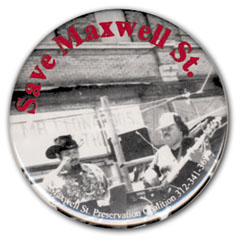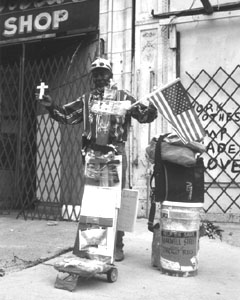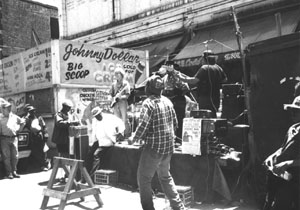 |
 |
|
|||||||||||||||||||||||||||||||||||||||||||||||||||||||||||||
Goiní Down Slow by Michael Felten
There are no more blues on Maxwell Street. It is a sunny Sunday morning market day and the street is nearly empty. A fellow named Lockhart who has sold tube socks on the street for the last fifteen years is still hawking his wares to anybody that stops for a Polish at Jimmyís on Halsted and Maxwell. Business is not good. He looks down the deserted street and sees only ankle deep garbage piled in the gutter. If the city of Chicago ever provided services to this area of town, they have long since stopped. The buildings are abandoned and boarded up. They wait for the wrecking ball that the folks down at city hall have been trying to wield for over a hundred years.
The block where Bernie Abramsí Maxwell Street Radio & Record Shop used to stand is already a parking lot for the University of Illinois Circle Campus. The place where you used to be able to hear Little Walter, Muddy, Floyd Jones, Daddy Stovepipe or Big Walter Horton play for free is now UIC Parking Lot 16, protected from the remaining neighborhood riff-raff by a stern wrought-iron fence. A prostitute seeking to supplement her Saturday night earnings leans on the wall next to Jimmyís and chain smokes. There are no takers, and she is finding it hard to smile. Itís all just a boring waste of time. An old piano sits abandoned on the street. Its keys are frozen and locked in a twisted jungle of wire. The days of singing sweet songs at the hands of a master are over. An old station wagon sits at the end of the near-deserted street. The suspension has given way under a load of metal auto parts. The carís overweight owner sits on a lawn chair next to a blanket on the ground thatís covered with rusty gears and pipes. His white T-shirt is smeared with grease, and heís wearing a dirty baseball hat. Two Hispanic guys in their mid-í20s are examining a living sculpture of metal. They are conversing in Spanish and trying to guess its original purpose. Across the street, an old Black man with no teeth sits in front of the one inhabited junk store. He is asked if there are any old records in the maze behind him. "Yeah, but I need those," he says. It is hard to believe that 70,000 people used The "new" Maxwell Street is a couple blocks to the east. There are city workers directing you into city parking lots, portable potties are lined up, and it seems that every other person on the street is a plainclothes cop. It is a generic, well-mannered flea market. You could be in Tulsa, Oklahoma or Columbus, Ohio. Salsa is the music in the air, and instead of Jimmyís grilled onion smell, you are hit with the odor of frying taco beef. No one grabs an elbow and discreetly offers a forearm covered with watches or a hand full of jewelry. If your hubcaps were stolen on Saturday night, you used to be able to go down to Maxwell and buy them back on Sunday morning. Where do they go now? Piano C. Red and Jimmie Lee Robinson still play the new market on occasion, but not on this bright, sunny day. A $7 imported Howliní Wolf budget CD that sits, fading in the sun next to a bunch of Commodores and Janet Jackson discs, is the only reminder of what was. On a Friday night I order a cappuccino and sit down at a table in a Borders bookstore. Jimmie Lee Robinson, a Maxwell Street native and a frequent street performer, is due to play an in-store set. The young lady behind the hissing coffeemaker tells us that Jimmy "Walker" will be performing in the café shortly. This Borders space used to house an Ace Hardware back before the gentrification came in. Young attorneys and real estate developers didnít want to look out the windows of their condos and see a hammer and nail joint. The Ace moved west to a strip mall where you could pull your Lexus or Land Rover into an ample parking lot and run in quickly for a couple of those halogen bulbs for your track lighting. The Borders café is like a library with concessions. The tables are solid oak. The chairs are firm and steady. No one has carved his initials into the furniture with a switchblade. There are no numbers to call for a good time. A fellow in an expensive suit and tie is reading a book on probability. He looks up and makes eye contact with me and quickly looks away. He has about ten books and magazines stacked up next to his briefcase. He has been there a long time. A young woman nervously sips her coffee and makes notes on two yellow legal pads. She has two cumbersome books open on her table. A young man with thick glasses hunches over a paperback. He is wearing headphones. Jimmie Lee Robinson walks in, dressed in black from the cowboy hat on his head to the tips of his boots. His spurs jingle. The eyes of the readers flick over the top of their books to see whatís going on. A Borders employee turns on the PA and it squeals. Jimmie smiles and sits down with his guitar. The fellow sitting immediately in front of Jimmie has his back to him; he doesnít turn when Jimmie begins to play. The audience is facing every way imaginable as Jimmie whistles his way through the first three songs. He is met with polite, conditioned applause. He seems to be searching his memory banks for a blues for tax accountants. He sings "C.C. Rider" and it seems to strike a responsive chord. A homeless guy stands leaning on his shopping cart outside the window, watching Jimmie Lee play. A couple of cops tell him to move along, and he slowly rolls away. It is a long way from Maxwell Street.
Michael Hearn, writing in the University of Illinois Circle Campus Flame, contends that Maxwell Street is "a smelly, rickety eyesore of a shit-house," the moral being that "crap is crap" and that Maxwell Street preservation is holding up real progress. He wants us to "cut the crap and bring on the Gap." The "crap" that everybody wants to move out of the way of shiny new progress is usually the poor guy who is scrambling to make a living. The "crap" is the tube socks peddler. The "crap" is the young blues musician trying to learn his trade. The "crap" is the con artist or street hustler trying to score. This same "crap" was packed up in a satchel, folded neatly next to some hope, rode up on that Illinois Central train headed north and wound up being sold on a blanket Sunday mornings on Maxwell Street. Now it has been torn down, jammed into a shopping cart and told to move on because it was spoiling the rich peoplesí view. If you listen to the lyrics between the guitar breaks, you know that the story of Maxwell Street is nothing new. Itís just another verse, just another song, just another blues, just some more "crap" moving on through the night.
|
|||||||||||||||||||||||||||||||||||||||||||||||||||||||||||||||
|
|

 Despite
the efforts of a couple of grass roots "Save Maxwell Street"
organizations, it looks like the rehabbers who have swarmed across the
city like locusts turning the gritty "city of the big shoulders"
into the city of the cell phone, valet parking and quarter-million-dollar-and-up-condominiums,
have won the day.
Despite
the efforts of a couple of grass roots "Save Maxwell Street"
organizations, it looks like the rehabbers who have swarmed across the
city like locusts turning the gritty "city of the big shoulders"
into the city of the cell phone, valet parking and quarter-million-dollar-and-up-condominiums,
have won the day. to crowd Maxwell Street on a Sunday market day. Sure, that was before
the Irish political bloc dropped the University of Illinois in the middle
of a politically-threatening Italian community to the immediate north
and sliced the eastern edge off of the street with the Dan Ryan expressway
ó but today, there isnít even a radio playing.
to crowd Maxwell Street on a Sunday market day. Sure, that was before
the Irish political bloc dropped the University of Illinois in the middle
of a politically-threatening Italian community to the immediate north
and sliced the eastern edge off of the street with the Dan Ryan expressway
ó but today, there isnít even a radio playing.